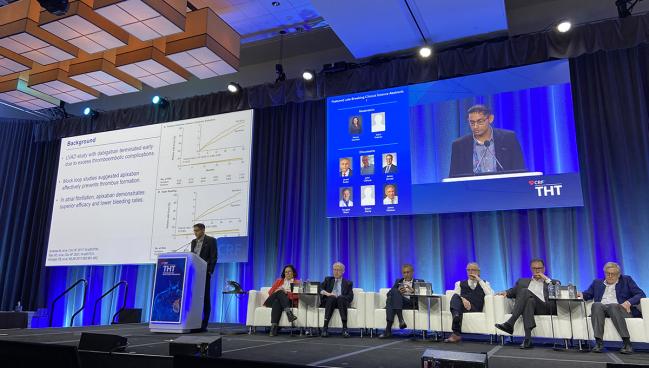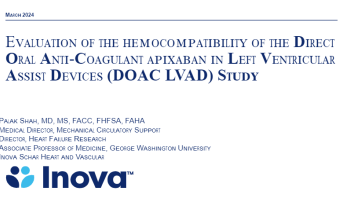Small Study Hints at Apixaban’s Potential in LVAD-Treated Patients
Safer LVAD devices and a DOAC known to reduce bleeding risk might allow for a shift from warfarin in this setting, experts say.

BOSTON, MA—It may be possible to use a direct oral anticoagulant (DOAC) in advanced heart failure (HF) patients recently implanted with a left ventricular assist device (LVAD), according to results from a small feasibility study.
In 30 patients, there was no significant difference in the risk of death or hemocompatibility-related adverse events, such as stroke, device thrombosis, bleeding, aortic root thrombus, or arterial non-central nervous system thromboembolism, between those treated with apixaban (Eliquis; Bristol Myers Squibb) and those treated with the standard warfarin.
Palak Shah, MD (Inova Schar Heart and Vascular, Falls Church, VA), who presented the study at THT 2024, said theirs result pave the way for a bigger trial. “We’re not seeing any concerning safety signal so now we’ll move to designing a sufficiently powered randomized trial to assess safety and efficacy,” he told TCTMD.
Currently, LVAD patients require ongoing oral anticoagulation with warfarin, but just as when it is used in other settings, it’s a challenging drug often disliked by those taking it. “Outside of the LVAD population, if you look at atrial fibrillation, venous thromboembolism, most patients who can and qualify for it will get a direct oral anticoagulant, such as apixaban,” Shah said. “In LVAD patients, there's been a reluctance to do that.”
That hesitancy, he added, is justified. In 2017, a small pilot study testing dabigatran for long-term anticoagulation in patients implanted with the older HeartWare LVAD (Medtronic) was stopped early because of an increased risk of thromboembolic events.
James Januzzi, MD (Massachusetts General Hospital, Boston, MA), one of the discussants following the presentation, said the feasibility study is a great example of “no guts, no glory” given the history of DOACs in these patients. Shah acknowledged the prior concerns with DOACs in this setting, but said they selected the factor Xa inhibitor apixaban over other DOACs for several reasons.
“LVAD patients have a gastrointestinal bleeding rate of approximately 15% at 1 year,” he told TCTMD. “Apixaban is one of the only direct oral anticoagulants that has been shown to reduce the risk not only of stroke, but also the risk of major bleeding. So there's a potential therapeutic benefit of using that as an anticoagulant. The other reason is that there were some mock-loop studies done that suggested apixaban effectively prevented thrombus formation.”
Joyce Wanglee Wald, DO (Penn Medicine, Philadelphia, PA), who wasn’t involved in the study, said that being able to get LVAD patients off warfarin onto another agent would almost certainly be welcomed. “It would probably improve quality of life significantly,” she told TCTMD. “If we could do a DOAC in LVADs, or you could get an LVAD that's hemocompatible where you don't even need a blood thinner, that would be even better.”
Reversibility in Bleeding Patients
The phase II feasibility study included 30 patients (93% male) implanted with the HeartMate 3 (Abbott Cardiovascular) who were randomized to apixaban 5 mg or warfarin (INR 2.0-2.5). The study was designed with built-in stopping criteria that allowed investigators to stop to the trial at any time for safety reasons. The median time from LVAD implantation to randomization was 115 days, with the device implanted as destination therapy for nearly all patients.
At 28 weeks, there were no deaths and no hemocompatibility-related adverse events in those treated with apixaban but two events—both gastrointestinal bleeds—in those treated with warfarin. Coagulation measures at 24 weeks, including D-dimer, hemoglobin levels, and lactate dehydrogenase, were not significantly different between the two treatments, nor was there any difference in rates of moderate or serious adverse events.
Ulrich Jorde, MD (Montefiore Medical Center, Bronx, NY), who also wasn’t involved in the study, acknowledged the limitations with warfarin, but said the drug does still have some advantages.
“Reversibility is one issue,” he told TCTMD. “People with LVADs still have gastrointestinal bleeding, much less than in the past. If you have a patient that comes in bleeding on warfarin, you can reverse it with multiple methods immediately and extremely safely. With [non-vitamin K antagonist oral anticoagulants], some of them have reversing agents, but it’s a lot more involved.”
He said there are still concerns in the field about the use of DOACs but pointed out that the hemocompatibility of the magnetically levitated, centrifugal-flow HeartMate 3, which was developed to minimize the destruction of red blood cells and thrombosis, is much better than earlier-generation LVADs. The ARIES HM3 trial, Jorde said, recently showed that physicians could drop aspirin in HF patients treated with HeartMate3 without any concerns about increased thromboembolic risk.
“What we understand now is that the LVADs have very different anticoagulation and antiplatelet requirements,” said Jorde. “We're slowly making our way to a more convenient, more reliable antithrombotic therapy.”
Both Januzzi and Jorde noted that patients were started on warfarin immediately after LVAD implantation and then randomized to apixaban or warfarin after a median of 3 to 4 months, which may have increased the safety of using the factor Xa inhibitor.
“If you look at the incidence of stroke, hemocompatibility-related adverse events, it's really in that first 3 to 6 months,” Shah acknowledged. “Stroke is almost just in the first 30 days. . . . As you get further away from that window, there is a higher likelihood of success with the direct oral anticoagulants.”
Given the improved hemocompatibility of LVADs, Shah added that physicians would likely to be using oral anticoagulation to treat a patient’s underlying atrial fibrillation (AF) as opposed to issues related to the pump, leading some on the THT panel to question whether oral anticoagulation after HeartMate 3 is even needed at all. Shah said that question is unlikely to be answered anytime soon, noting that 70% of patients in this study had AF and 30% had a history of venous thromboembolism.
Michael O’Riordan is the Managing Editor for TCTMD. He completed his undergraduate degrees at Queen’s University in Kingston, ON, and…
Read Full BioSources
Shah P. Direct oral anticoagulant apixaban in left ventricular assist devices (DOAC LVAD) study. Presented at: THT 2024. March 5, 2024. Boston, MA.
Disclosures
- Shah reports grant support/research contracts with Abbott, Bayer AG, Merck/Schering Plough, and Roche. He reports consulting fees/honoraria/speaker’s bureau fees from Natera, Merck/Schering Plough, Ortho Clinical Diagnostic, and Tosoh Bioscience.






Comments